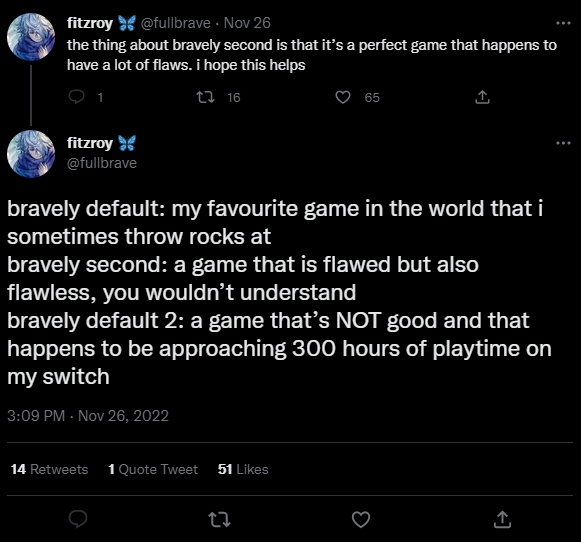Bravely Default Web Shrine!!!
This is my favorite game / game series ever. Sorry if I lose the hash tag subscribers (not actually sorry). Click on any of the game covers to open up my brain.
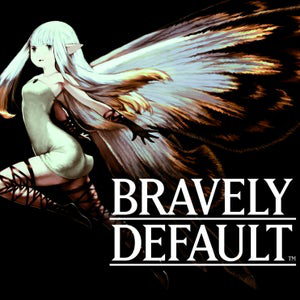
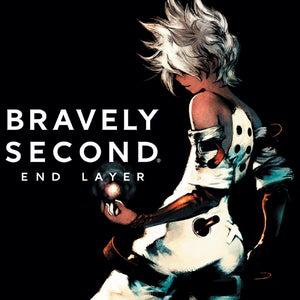
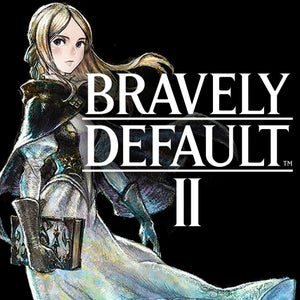
Bravely Default: Flying Fairy
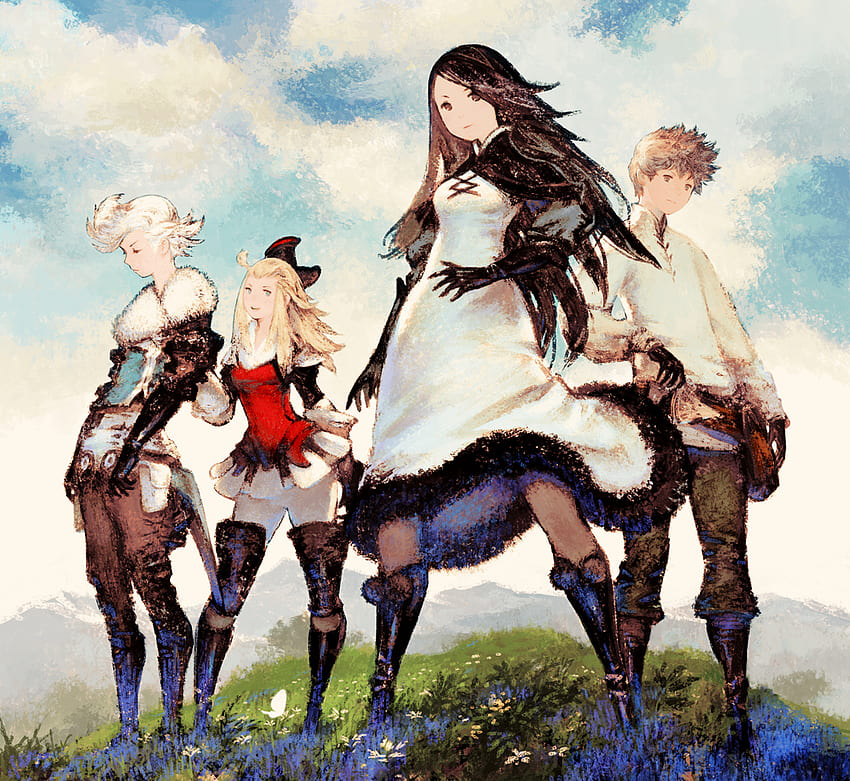 Bravely Default, known in Japan as Bravely Default: Flying Fairy, is a role-playing video game developed by Silicon Studio for the Nintendo 3DS handheld console. Bravely Default was originally released in 2012 and later rereleased as an expanded edition in 2013 subtitled For the Sequel in Japan. For the Sequel was later released in Europe, Australia, and North America in 2014 simply titled as Bravely Default. This expanded edition used the subtitle Where The Fairy Flies in territories outside of Japan. Square Enix published the game in Japan, while Nintendo handled publishing duties overseas. The gameplay uses a turn-based battle system and job system, in addition to incorporating options to combine job abilities and adjust battle speed and random encounter rates.
Bravely Default, known in Japan as Bravely Default: Flying Fairy, is a role-playing video game developed by Silicon Studio for the Nintendo 3DS handheld console. Bravely Default was originally released in 2012 and later rereleased as an expanded edition in 2013 subtitled For the Sequel in Japan. For the Sequel was later released in Europe, Australia, and North America in 2014 simply titled as Bravely Default. This expanded edition used the subtitle Where The Fairy Flies in territories outside of Japan. Square Enix published the game in Japan, while Nintendo handled publishing duties overseas. The gameplay uses a turn-based battle system and job system, in addition to incorporating options to combine job abilities and adjust battle speed and random encounter rates.
Bravely Default is set in the world of Luxendarc, which is kept in balance by four elemental crystals protected by the Crystal Orthodoxy, a religious group with influence across the world. The story follows the adventures of four protagonists: Agnès Oblige, vestal of the Wind Crystal, who was forced out of her duties after the crystals were consumed by darkness; Tiz Arrior, the sole survivor from a destroyed village caused by the crystals' blight; Ringabel, an amnesiac philanderer trying to uncover a mysterious journal in his possession; and Edea Lee, a defector of a large army bent on capturing Agnès. Together, the party aims to reclaim the four crystals from the darkness and confront a greater evil along the way. (source: Wikipedia)
Introduction
Bravely Default: Where the Fairy Flies is also my favorite game of all time! There isn't a single thing about the game that I don't think is perfect. I first played the game when the expanded version released in the west in 2014. I was a freshman in high school at the time and had nothing better to do but play silly 3DS games. I was drawn to the game by its pleasantly vibrant art style, and the music, gameplay and story kept me hooked. I have played through the entire story twice, and am working on my third playthrough. Bravely Default has been my favorite game since I played it, and it still is to this day!!!
Dev Team
Bravely Default was produced by Tomoya Asano (and Team Asano); the team also produced two other titles in the series, as well as Octopath Traveler, Triangle Strategy and Live A Live. I've also played Octopath Traveler and enjoyed it, and I have tried Triangle Strategy (though I'm not big on the strategy RPG genre). Bravely Default's lead artist was Akihiko Yoshida, whose work has also been seen in other Square Enix works. I really like the texture quality of his work, and admire how he brings out the character in Bravely's designs. Revo is the composer of the game; though he didn't compose for Bravely Second: End Layer, he returned to the team to compose the soundtrack for Bravely Default II. Revo is also the lead of Japanese symphonic rock group Sound Horizon. Bravely Default: Where the Fairy Flies's writing team was led by Naotaka Hayashi and Keiichi Ajiro, the former most known for his work on Steins;Gate.
Favorite Characters
Every Bravely character is endearing to me - I could go on and on about any of the protagonists or antagonists/asterisk holders. My favorite protagonist is Edea Lee, and my favorite asterisk holder is The Jackal.
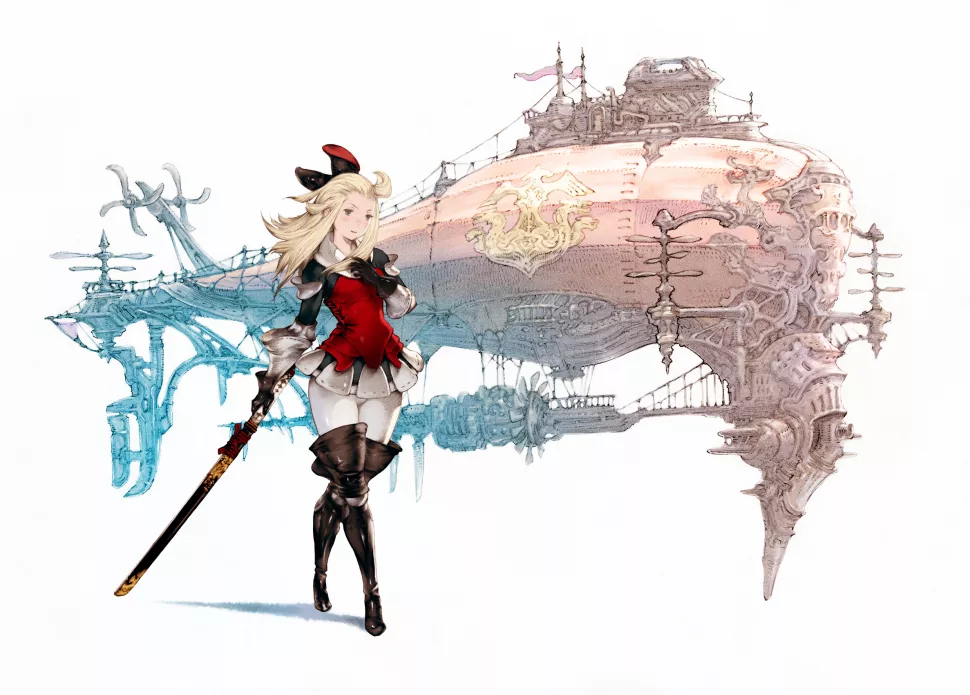 Edea Lee is a tomboy with a temper. Driven by heroism and morality, Edea wants to do what she believes is just and right. This presents itself as the statement/question she repeats throughout the game - to be "black or white." Her father, Braev Lee, is the Duchy of Eternia, leader of the Eternian forces. Trained under a powerful swordsmaster, Edea was raised to respect and honor both her allies and her enemies. Quickly rising in power, Edea took on a mission to capture the Wind Vestal in Caldisla to win her father's pride and respect.
Edea Lee is a tomboy with a temper. Driven by heroism and morality, Edea wants to do what she believes is just and right. This presents itself as the statement/question she repeats throughout the game - to be "black or white." Her father, Braev Lee, is the Duchy of Eternia, leader of the Eternian forces. Trained under a powerful swordsmaster, Edea was raised to respect and honor both her allies and her enemies. Quickly rising in power, Edea took on a mission to capture the Wind Vestal in Caldisla to win her father's pride and respect.
After watching her commanding officer, Ominas Crowe, set Caldislan homes ablaze on his search for the Wind Vestal, Edea has an alarming change of heart. She takes a leap of faith and defects from the Eternian Sky Knights, believing that anyone who would harm innocent lives could not possibly be of good morals ("white"). Though her resolve is strengthened as she witnesses more and more Eternian Knights commit needlessly cruel acts in pursuit of their goals, Edea's later adversaries prove that perhaps morality is a bit more "gray" than she thought...
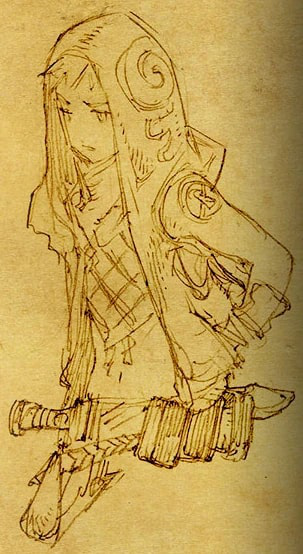 The Jackal is the holder of the Thief asterisk and the leader of a band of countless cold-hearted thieves. He and his bandits were hired by Khamer & Profiteur Merchantry to attack any Ancheim citizens that try to approach the nearby oasis. The Jackal is an extremely irritable and violent boy due to a harsh upbringing - he strongly believes that there are only two types of people in the world: those who take and those who lose. Though he guards an oasis, he often reports his throat feeling painful or sore from thirst. This parched feeling a chronic and traumagenic symptom stemming from being abandoned as a child and suffering from dehydration as he wandered the desert. The Jackal is easily manipulated, and will swing wherever he feels benefits him the best.
The Jackal is the holder of the Thief asterisk and the leader of a band of countless cold-hearted thieves. He and his bandits were hired by Khamer & Profiteur Merchantry to attack any Ancheim citizens that try to approach the nearby oasis. The Jackal is an extremely irritable and violent boy due to a harsh upbringing - he strongly believes that there are only two types of people in the world: those who take and those who lose. Though he guards an oasis, he often reports his throat feeling painful or sore from thirst. This parched feeling a chronic and traumagenic symptom stemming from being abandoned as a child and suffering from dehydration as he wandered the desert. The Jackal is easily manipulated, and will swing wherever he feels benefits him the best.
After the events of Bravely Default: Where the Fairy Flies, The Jackal is moved by Edea's statements about doing the right thing and has reformed him and his group. Now, instead of cold-hearted bandit work, his band serves as vigilante for the desert, helping those who are vulnerable. He also goes out of his way to raise orphans with "good" thieving morals - telling them to ONLY steal from rich people, and never from old or weak people.
Music
I am so very in love with the original soundtrack for this game. Revo did a fantastic job capturing the magical world of Luxendarc through music. The depth of each track is ahead of its time, and I strongly believe the OST rivals that of modern AAA titles!
Revo's ability to enhance pre-established worldbuilding and character lore through careful instrumentation is one of my favorite aspects of the Bravely soundtrack. For example, in the town theme for Ancheim ("Land of Sand and a Large Clock"), a percussive ticking sound can be heard in the background. This hard pulsing rhythm manages to complement the syncopated melodies remniscent of typical RPG desert towns, but adds a new layer - IT'S A CLOCK!!! Wow. A lesser known detail is that the song/rhythm is 120bpm, which means every two clock ticking noises equals one second. Just like an actual clock!!!
The Bravely Default soundtrack feels grand and majestic. The world it shapes alongside the art and design is welcoming and full of life.
My favorite song in the Bravely Default soundtrack is pretty hard to pick. If I had to do a top five (no order), here's what I would go with:
- Toward that Prayer
- Four Legends
- Beneath the Hollow Moon
- The Day the Wind Blew
- Ballad Moving Toward Hope
Art Direction
The in-game art for Bravely Default is charming and aged fantastically on the 3DS. I think part of what makes the Bravely Default in-game art so charming IS the pixel compression (+ artifacting) native to the 3DS. It gives the low-poly character models and hand-painted backgrounds a fuzzier look, ultimately resulting in a cohesive style.
(more to come on this ... i still have a lot more to talk about)
Narrative
Bravely Default's story begins with Tiz Arrior, whose village (Norende) is swallowed up by a giant chasm in the opening cutscene. Though he's told to not hold out hope for any other survivors, Tiz immediately runs over to his old home to do something, *anything*. There, he meets Agnes, a vestal to the Wind Crystal (basically...an acolyte to a conduit of natural magic) who is visiting the ruined village. The two find hope within each other and set off to find answers and close the chasm. Soon after they begin, they're joined by Ringabel (a flirty amnesiac with a journal that tells future events, rather than past events) and Edea Lee (defector of the Eternian Forces, an organization that is seeking to capture Agnes). The four work together to find the answers to their own personal questions, awaken the four Crystals, and save Luxendarc from ruin.
Bravely Default's story is... incredibly dense and detailed, but also incredibly well-told and utilizes every aspect of the game. Yes, it tells its stories in dramatic cutscenes and strings of textboxes. But its storytelling is further enhanced through its visuals, soundtrack, and lore.
MAJOR SPOILERS AHEAD - Click here to open text
... Except they don't actually save Luxendarc—at least... not at first. It turns out that Agnes' cryst-fairy companion, Airy, was an evil plant. She secretly served the big bad (Ouroboros), and in awakening the Crystals again (and again (and again (and again))), the party has cleared a neat and tidy path for Ouroboros to cross through various worlds and consume them. Oopsies! If only someone warned us about that.
The beautiful part is we were warned. By the exposition vampire and the shit-mouthed sage. Sorry. I like Bravely Default's characters, I'm just being flippant. Bravely Default does warn its players of danger in more subtle and interesting ways. Everyone knows about Airy's wing patterns shifting with each "loop"—the patterns resembling a number counting down to 0.
That's not all, though. A friend pointed out an interesting detail in Chapter 2's dialogue. The party met with Olivia Oblige, the Water Crystal's vestal, in a secret location. Olivia tells Agnes that the vestal of fire has been killed, and Airy exclaims:
"No! Then that means you two are the only ones still able to awaken the crystals!"
Which is something that adds up perfectly fine with the player. Yep, vestals awaken crystals to save the world and keep the natural order, that's their job, and that's what we've been doing and what we need to keep doing. Except Olivia replies:
"Awaken...? What does she mean? And what...what is she?"
A single line of dialogue that's soon glazed over and "forgotten" by Airy's exclamation ("I'm not a monster. I'm a cryst-fairy!") and Agnes' explanation ("We must awaken all four crystals to dispel the evil shadow spreading over the land"). And then Olivia shrugs and is like "wow Agnes you've really grown!" and... that's that. Olivia doesn't know what a cryst-fairy is. She doesn't know what "awakening" a crystal means or does, or why it needs to be done. And she's supposed to be at the same "rank" as Agnes—why do they not know the same things? It's so quick, and so easy to miss that I missed it twice. If my friend hadn't pointed it out, I probably would've missed it again. And that's the beauty of Bravely Default's narratives. Its storytelling is found in every layer of subtlety and every aspect of the game. Yes, Bravely Default will slam you over the head with the Story Hammer(TM), but it sneaks these little details in that really sell the twists.
So much of Bravely Default's story is also told through its music. During my second playthrough, I'd often stop after entering each town and carefully listen to the composition. Caldisla's slow and familiar fanfare (which includes harmonic/rhythmic callbacks to Bravely Default's main theme), Ancheim's theme wrapped around the perfect ticking of a clock, Hartschild's marching rhythm that devolves into a chaotic gatling of strings, Eternia's delicate twinkles that lead into a bright woodwind melody (an instrument often paired with Tiz his thematic associations: hope and clarity). Revo's careful placement of instrumental/melodic motifs tell Bravely's story for itself. I can't tell you how many times I've listened to Bravely Default's OST in order and felt like the story was playing out before me.
The environments are no less careful in detail. In Eternia, vein-like cables are sprawled along the city's infrastructure. When Tiz questions what they're for, Edea explains that they siphon energy from the Earth Crystal to amplify white (restorative) magic. Of course, Edea knows this because she literally grew up here and her mom (Mahzer) has always benefitted from Eternian healthcare. We learn pieces of Edea through her knowledge of this lore, and we learn about her priorities and conflict of interests when she realizes what that means with respect to helping Agnes awaken the crystals.
It was actually Edea's father (Braev) who pushed forward the developments to healthcare—he did so because he loved Mazher. Once a cleric for the Crystal Orthodoxy, he aligned himself with anticrystalism in order to gain control of the Earth Crystal's power to save the love of his life. "Have the courage to disobey." Braev literally carved his own right and wrong, ripping himself from his upbringing in order to do what he felt was the right thing to do. Sounds familiar? His story is a "completed" parallel version of Edea's.
Everything ties together so nicely in Bravely Default's narrative. Though the world leaves some questions (helloooo Bravely Second), the narrative of the game itself feels complete and whole. Bravely Default is more than just a world full of meaningful lore, it's a story full of meaningful themes and explorations.
(I have a lot more to say here, and honestly I need to proofread what's already said pretty hard. But I just wanted to upload this piece because I didn't want to leave this page blank for so long!)
Personal Experience
I'll be honest, I don't remember the first time I played Bravely Default. I don't even remember how I got my hands on the game. The same friend from before told me a really touching story of how he learned about the game and received it as a holiday gift... Kinda makes me wish I remembered my "origin story" LOL... Unfortunately it's locked away in the black box of memories from this period of my life. Maybe one day I'll remember, and I can update this page.
MAJOR PLOT SPOILERS AHEAD - Click here to open text
Anyway, this also means I have no idea what my initial reactions were to this game. I would check my journals and sketchbooks from this period, but a lot of them were lost due to a flood and I haven't had the chance to check if there's anything left to glean. All I know is I *really* liked this game. Every time I think about it, I get this really strong emotional reaction—even if I don't fully understand why. I did end up replaying the game in college and it felt nice to go through the story. Bravely Default is ridiculously fun to play. The game provided me with so many toys to mess around with, and I never grew bored. Yes, even through the second half of the game that's so dreaded and dogged on by fans. I think part of the reason why I still enjoyed the game even when it got "repetitive" was because there was still something new for me. Learning more about the asterisk bearers' lives across different timelines helped me gain a stronger understanding of their character and the world around them. The world of Luxendarc was a fun one to explore—there is more than meets the eye!
Currently, I am doing a third playthrough (technically fourth, if you count the separate playthrough that I'm streaming to some friends) in order to 100% D's journal. Did you know there are some enemies that can only be encountered in earlier chapters of the game? I can't believe Bravely did that. Well, any excuse I can take to replay it all over again...
Bravely Default II
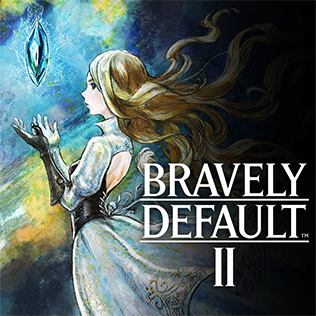 Bravely Default II is the third main game in the Bravely series, following the original game Bravely Default and its sequel Bravely Second: End Layer. While Second was a direct story continuation from the original, Bravely Default II features a new story and cast of characters. Similar to prior titles, the game plays as a role-playing video game with turn-based battles. The game contains an updated variant of the prior games' "Brave Point" system and use of collecting different "asterisks" to change a character's job class.
Bravely Default II is the third main game in the Bravely series, following the original game Bravely Default and its sequel Bravely Second: End Layer. While Second was a direct story continuation from the original, Bravely Default II features a new story and cast of characters. Similar to prior titles, the game plays as a role-playing video game with turn-based battles. The game contains an updated variant of the prior games' "Brave Point" system and use of collecting different "asterisks" to change a character's job class.
Bravely Default II is set in a new world from prior games, on a continent named Excillant divided into five different kingdoms. The game follows four main characters; a mysterious young sailor named Seth, a refugee princess named Gloria, a traveling scholar named Elvis, and a mercenary named Adelle. The party sets off across the continent to retrieve the crystals of the four elements. These crystals were stolen from Gloria's destroyed homeland of Musa. Meanwhile, Elvis is trying to decipher an ancient book that cannot be read under normal circumstances, but occasionally reveals secrets of the past when it comes into contact with an Asterisk, which are powerful magical gems that grant knowledge and power. (source: Wikipedia)
Introduction
To me, Bravely Default II was a remarkable game experience that was juuuust faithful enough to the Bravely brand to scratch my itch, but not enough to truly hold it up with the original (or even Second). I was surprised that I actually enjoyed the new world of Excillant, as I was originally very discouraged by the fact that the story would not be taking place in the charming and familiar Luxendarc. I have played this game in its entirety once through, but at the time of writing this page I have yet to complete all of the post-game content (Halls of Tribulation).
Dev Team
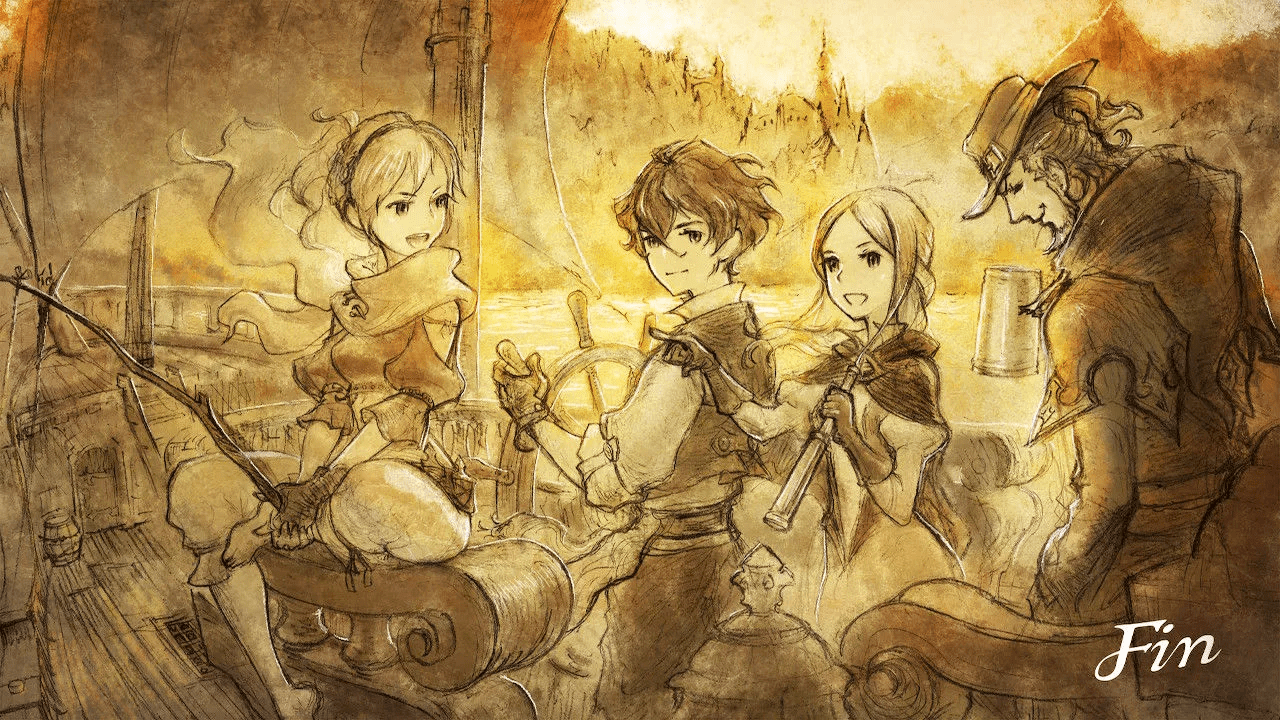 Just like the previous titles, Bravely Default II was produced by Tomoya Asano (and Team Asano) in addition to Masashi Takahashi, who'd also worked with Asano on Octopath Traveler. Later on, the two would also produce Octopath Traveler II together. This time around, Akihiko Yoshida would not take part as an art lead, replaced by Hajime Onuma (another Bravely Default: Where the Fairy Flies artist) and more notably Naoki Ikushima. This is reflected in much of the concept artwork for the game, as it resembles Ikushima's other work with Team Asano's other Nintendo Switch titles (Octopath Traveler, Triangle Strategy, Live A Live, and Octopath Traveler II). Returning as the game's composer was Revo, which was an exciting surprise for many (if not all) Bravely fans. Bravely Default II's writing team would again change significantly from previous titles, with lead writers Yura Kubota and Tomoyoshi Nagai. The former is also known for his work with action RPG Trinity Trigger.
Just like the previous titles, Bravely Default II was produced by Tomoya Asano (and Team Asano) in addition to Masashi Takahashi, who'd also worked with Asano on Octopath Traveler. Later on, the two would also produce Octopath Traveler II together. This time around, Akihiko Yoshida would not take part as an art lead, replaced by Hajime Onuma (another Bravely Default: Where the Fairy Flies artist) and more notably Naoki Ikushima. This is reflected in much of the concept artwork for the game, as it resembles Ikushima's other work with Team Asano's other Nintendo Switch titles (Octopath Traveler, Triangle Strategy, Live A Live, and Octopath Traveler II). Returning as the game's composer was Revo, which was an exciting surprise for many (if not all) Bravely fans. Bravely Default II's writing team would again change significantly from previous titles, with lead writers Yura Kubota and Tomoyoshi Nagai. The former is also known for his work with action RPG Trinity Trigger.
Favorite Characters
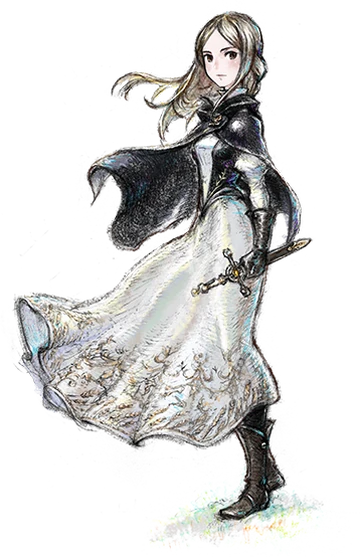 Continuing the pattern of selecting one protagonist and one antagonist/asterisk holder to spare myself, my favorite protagonist would be Gloria Neu Musa (though it's a close one with Adelle Ein), and my favorite antagonist would be Gladys Kelly.
Continuing the pattern of selecting one protagonist and one antagonist/asterisk holder to spare myself, my favorite protagonist would be Gloria Neu Musa (though it's a close one with Adelle Ein), and my favorite antagonist would be Gladys Kelly.
My fondness for both of these characters is wickedly self-indulgent. Gloria Neu Musa is STUPIDLY similar to one of my own OCs, and it's by sheer coincidence. I had most of her character/lore written before getting super into Bravely Default II (see: Personal Experience), and playing that game was like getting it in the head with a ton of bricks.
Gloria is like a White Girl Wednesday to me. If you don't know what that is, it's a meaningless joke term that I use to refer to female characters that I enjoy who also happen to be caucasian (or appear such). I love failprincesses. I love women with a (self-proclaimed) duty that consumes their entire sense of self and directly affects their self-worth. I like to imagine girls like this snapping. I think Gloria should get to snap more, honestly. I think Bravely Default II should've let her blow up, but I'll get more into that at another point.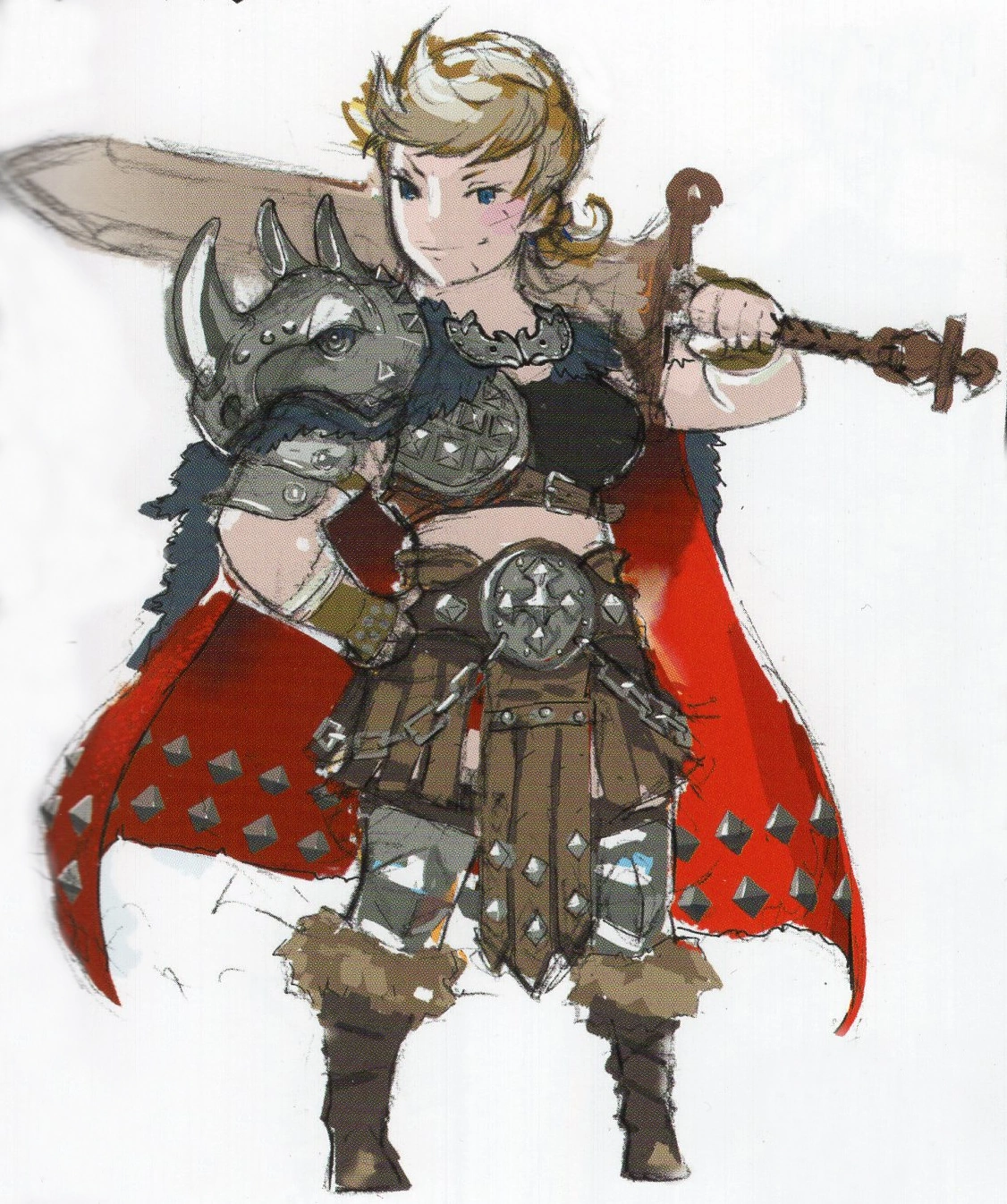
Gladys, on the other hand, is the masculine woman I've been begging Team Asano to grant me for many years. I actually first saw her on the Bravely Default II wiki while looking for something else. It was during my "hiatus" from the game, and it was (I say this with completely zero shame) one of the main reasons I got back into the game. I like to joke that Team Asano made that character for me, personally.
I'm a really big fan of Gladys' arc and the Rimedhal chapter in general, but I'll be writing about that in the section protected by a spoiler warning, haha.
Music
Revo returned as the composer for this game, and he did not disappoint! The Bravely Default II soundtrack has a delightful mix of old and new motifs. My favorite songs in no order are the following:
- An Oath to the Brave Ones
- The Princess's Pride Blossoms in the Rain of Sorrow
- Shadows Cast by the Mighty (all of them, but specifically Vigintio's version)
- Eyes That Gaze into the Nexus - The Ones Who Gather Stars in the Night
- Never Forgotten, Never Erased - Onward Into the Light: A Ballade
Okay, so the song titles in this game were kind of crazy. Really really beautiful stuff though. Revo had put a brilliant amount of detail to enjoy in the original Bravely Default's songs, and I feel like he made good use of the space to outdo himself here. There are places where the original soundtrack is referenced in a way that totally knocked my socks off.
The first time I heard An Oath to the Brave Ones, I felt so moved to see the game's story through. When asked about Octopath's compositions, Yasunori Nishiki noted that his guiding force with composing is to write a song that makes people feel something. Even if it's just a song to make someone nod their head to the rhythm, the goal should always be to move the listener somehow. I think that Revo captured this so well with everything he wrote for this game. Though the first game's soundtrack was the foundation for much of this game's iconic tracks, I think that Bravely Default II's soundtrack wins me over more strongly than Bravely Default: Where the Fairy Flies'.
Personal Experience
Bravely Default II was an interesting experience for me. I remember for years after Bravely Second's release I would joke about every Nintendo Direct being "the one" to announce a new Bravely Default game. At some point (after Octopath's release, I think?) I made the joke a little less often because (even if it was meant to be ironic) I'd feel kinda bummed out with no news. I'd continue to be pretty cynical/bummed about Bravely news for a while.
The Reveal
That is, until The Game Awards 2019. Five seconds in, I'd see the Square Enix logo, and it would mean very little to me beyond an "oh boy! another 80 hour JRPG to sink my teeth into!" ...And then the familiar Revo composition filled the silence, followed by a narrator calling "it is time..." He actually said "it is time to choose: accept your fate and await oblivion, or make a stand and fight for survival," but I think I legitimately started wailing "OHHH MY GOD IT IS TIME IT IS SO TIME IT IS SO SO TIME" so loudly that I could not make out the rest of the trailer, and had to go watch it again later on YouTube.
Flashes of beautiful environments, a shot of the main quartet, the great reveal that Revo would return as the game's composer, closed off with the simple beauty of the title: Bravely Default II. HUH? Bravely Default II? What was Bravely Second?! (All of us Bravely fans would collectively say this, even if many of us would treat Bravely Second like some weird unfamiliar cousin to the original).
To say I was elated was an understatement. So what if this game didn't have a curiosity-piquing subtitle? So what if one or all of the characters looked a little odd in the new-ish 3D style? This was a BRAVELY GAME, and by god was I going to talk about nothing but this for the next who-knows-how-long. I remember bugging my gf about it CONSTANTLY up until its release. I got the game day one, and started it as soon as I could. Sorry for not finishing you, Octopath Traveler.
The Demos
Before we get to the actual game, though, let's talk about the demos. Bravely Default II had two demos. I only had the opportunity to play the second one, but I was keeping close tabs on how things went with the first one. I will say that I think it was an amazing idea for Team Asano to push these demos out to people and ACTUALLY take in feedback. The first demo revealed that the battle system in Bravely Default II would be slightly different from its predecessors - instead of planning and executing all of your party members' moves at the same time, you would only be able to plan one before executing. 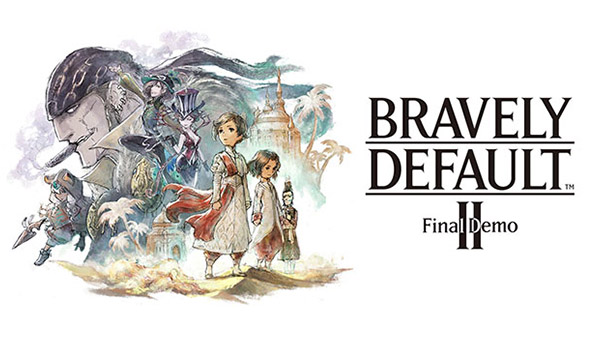 This made the series' titular BRAVE and DEFAULT system difficult to manage (as one unit could potentially act twice before another thanks to some arbitrary speed calculations), and it took away some of the tactical charm that was present in the older titles.
This made the series' titular BRAVE and DEFAULT system difficult to manage (as one unit could potentially act twice before another thanks to some arbitrary speed calculations), and it took away some of the tactical charm that was present in the older titles.
Team Asano was made very well aware of these issues by testers, but it wasn't feasible to completely change the system at this point. They weren't going to ignore this feedback though, and moving into the second demo they would integrate new UI hinting at turn order. I still think they could've improved on this further (perhaps having a turn order bar, similar to Octopath Traveler), or perhaps unifying what the marker actually is (for players it's a meter that charges after any given unit performs an action, and for enemies it's an exclamation point when they are going to act soon) but I appreciate the effort to improve player experience nonetheless.
The Release - MINOR SPOILERS AHEAD
Day one, Bravely Default II was preloaded on my Switch and I WAILED upon launching it. I was barreling through it - for better or for worse. I'd put up with the slight lag when opening the menu (which would often lead me to accidentally auto-healing my party since the trigger to do so was just hitting the menu button again after opening the menu), the awkward timing of the battle system, Elvis' model, all the way up until the battle against Prince Castor, holder of the Berserker asterisk.
For an early-game boss, that guy was BRUTAL. He would wipe out my party again and again with his counters (which was another new gimmick in this game. Although devastating, I actually appreciated that it made me rethink my moves), and I had to put down the game for a few weeks or so. Maybe a little bit longer, I don't remember.
I'd eventually pick the game back up again and beat him, but would get stuck again soon after in the sewers underneath Wiswald. The monsters on the second or third level were just wiping the nasty, nasty floors with my party. I don't remember who, but someone told me to flick my game from NORMAL mode to CASUAL. I decided against it because my pride was too big. I would not pick up the game again beyond a couple frustrating battles for many, many months. I would not be surprised if a year had passed, but I'm not entirely sure how long it was.
I would pick up the game again, for real this time. I was determined to see this game to the end, I felt like I would be disrespecting Team Asano if I didn't. Ultimately, I'm glad that I did.
The Rest - MAJOR SPOILERS FOR ALL THREE GAMES AHEAD
Click here to open text
Turns out that even though the game IS harder to cheese than its predecessors, it is also kinda easier. I'd learn of ways to build my party to cooperate with the new systems thanks to the help of an early-game JP grinding spot (that would actually become useful in my late-game grinding as well... which is insane). It wasn't long before my party was the one doing the sewage sweeping.
The story would only climb in favor from there. Bravely-brand drama and trauma, failed love stories, successful love stories, fairy intervention, mindblowing meta narratives... This was it. One of my favorite cutscenes was the scene with Martha's trial where Adelle transforms into her fairy form in order to rescue her. Sure, this WAS the yuri scene. I mean, Martha was CLEARLY head over heels, and what was Adelle's "don't talk, you'll bite your tongue?" IS ANYONE ELSE SEEING THIS? HELLO? Martha literally looked at a being that everyone saw as a wretched demon, hideous and unholy and deserving of no more than a painful death, and said "YOU'RE BEAUTIFUL"?!!?!? IS ANYONE ELSE SEEING THISSSS!!!!???! (Image on the right was taken from a Reddit thread on r/bravelydefault. I need to go back and take my own screenshot soon because I actually don't like this one so much)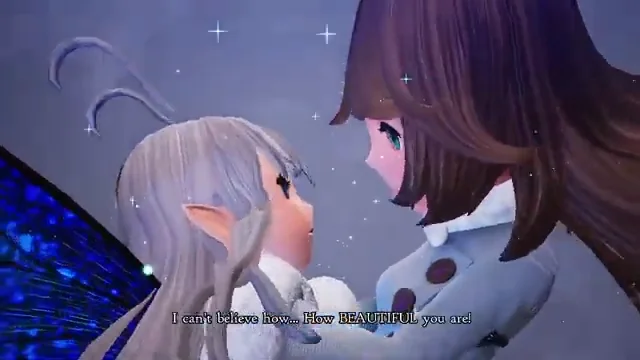
Ahem. I also liked this scene because in past Bravely games, the fairy was always the bad guy. The fairy was the twist villain that was manipulating the puppet villain (but also... ended up being a puppet villain to some interdimensional eldritch terror? Team Asano, what's up with this pattern anyway?). But, in Bravely Default II, the fairy was in your party, the fairy was your friend. The fairy revealed herself to be a fairy, potentially sacrificing everything (including her friendships and trusted allies) to do something good. Bravely Default II had reinforced the classic Bravely formula well, but to take something so fundamental to the past two games and shake it up like this was just so awesome.
The Rimedhal chapter in general was very well written, in my opinion. To open things succinctly: it's written like how I felt all of Bravely Default: Where the Fairy Flies was written. There were real, permanent consequences of the events that occurred within the chapter. During the fairy trials, countless innocent people were killed at the hands of the Rimedhal Orthodoxy. Few of these innocents have names or stories written out in the game, but the impact is very apparent in scenes such as where Father Rhydion peers at the corpses inside the Jaws of Judgement. Here, he confirms what he's always known deep down: that his daughter, Margeret, is dead - and so is everyone else that was thrown down the Jaws.
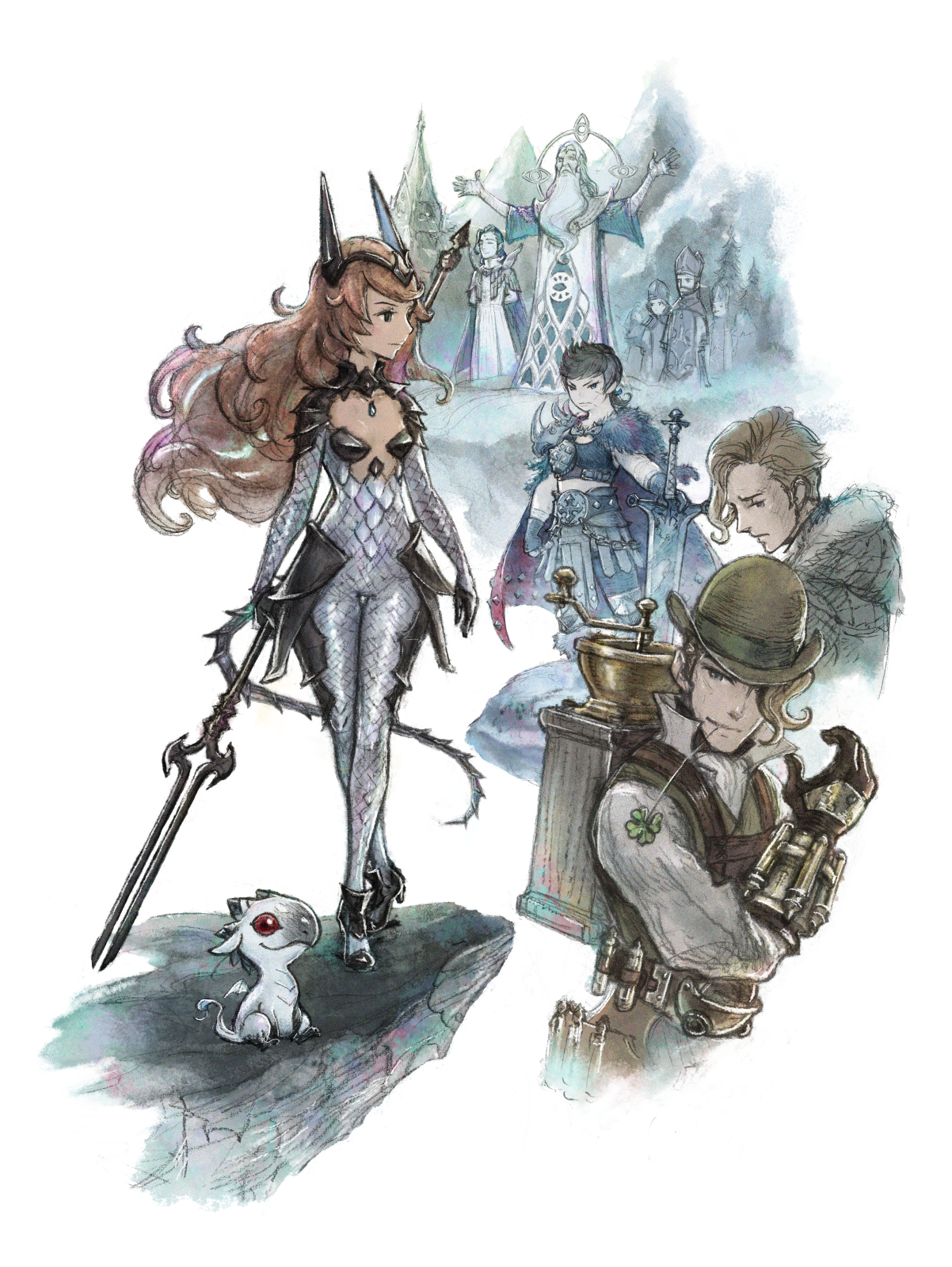 Gladys has a very compelling arc in this chapter that is remniscent of the character/antagonist writing in the original Bravely Default. A woman who was separated from her only other kin (Galahad) after their parents died, she had nobody to look to for guidance but the Rimedhal Orthodoxy. She would be raised as their sword (where Galahad was Wiswald's stalwart shield), instructed to spearhead the slaughter of these very innocent people in the name of eradicating fairies (where Galahad's only order was to protect the knowledge of the Institute and the scholars that studied it).
Gladys has a very compelling arc in this chapter that is remniscent of the character/antagonist writing in the original Bravely Default. A woman who was separated from her only other kin (Galahad) after their parents died, she had nobody to look to for guidance but the Rimedhal Orthodoxy. She would be raised as their sword (where Galahad was Wiswald's stalwart shield), instructed to spearhead the slaughter of these very innocent people in the name of eradicating fairies (where Galahad's only order was to protect the knowledge of the Institute and the scholars that studied it).
Of course, Gladys also harbors hatred for fairies, under the impression that they were the killers of her parents. When Holograd attacks, however, she realizes that she has a duty greater than avenging her parents. Just like her brother Galahad for Wiswald, Gladys holds honor to the people in her heart, and she realizes her true duty was to protect Rimedhal and help its people - to use her sword as a shield. She would prove a great help in the fight against the Holograd invasion. There is a cutscene where she nobly saves the life of a citizen without a moment's hesitation, directly contrasting her ruthless killings with no second thought.
But, this is where the permanent consequences settle in. Saving a life doesn't return a taken one. The daughter of this particular saved citizen was killed by Gladys in the fairy trials, and instead of thanking Gladys, he takes advantage of the situation and literally stabs her in the back. A justified action, all things considered, and Gladys has the maturity and awareness to understand this. It is here that Bishop Helio reveals the one thing that she should've been told from the start - that he was her parents' assailant. Gladys attacks Helio with the intent to take vengeance, but knew that it would be futile. She knows that any attempts at vengeance will only end in bitter failure. However, she would knock the fire crystal from his clutches and return it to the protagonists before passing away in Adelle's arms (I think it's Adelle's at least. Could also be Gloria's, but I have to rewatch the cutscene).
Ultimately, Gladys' story is that of a woman who was governed by fear and grief, killing in the name of it. She projected this fear and grief upon others through her contributions to the fairy trials, and - as the cycle of revenge goes - she would die at the hands of someone afraid and grieving because of her. Finally, her story would end with her death at the hands of someone who underwent their own fear and grief. This was a Bravely Default: Where the Fairy Flies story, but ported to Bravely Default II. It's kind of a shame that no other arc/chapter has such rawness to it, because they were clearly capable of writing something poignant. But I'm trying to talk about what I like about this game, so I'll get into this more later.
I was also a fan of the "meta" devices in this game. Every Bravely game seems to toy with the fourth wall somehow, so I was happy to see that Bravely Default II takes a stab at following the tradition. The save menu being the key to destroying the Night's Nexus' memories was really cool to me, and I liked that the fake endings were more akin to divinations from the book itself. What I especially enjoyed was the credits themes. In the two fake endings, the credits rolled with the beautiful vocalized ending credits song, just like in Bravely Default: Where the Fairy Flies and Bravely Second: End Layer. In both previous titles, these songs would signal the true ending of the game (and boy what a reward those songs were). At first, I was confused by the first fake ending while hearing this game's credits song. My thoughts were something like "this game can't end with Gloria dying. That's not right. That's sooo not right. No shot."
And then I heard the last few notes in the credits theme. A trailing piano tune remniscent of Gloria's character theme. It ends on a note outside of the key, a musical symbol that the song isn't quite over yet. This happens in the second fake ending as well - corresponding with Adelle's sacrifice was an off-tune slowed-down version of Adelle's character theme. It made me wonder if any other characters would try sacrificing themselves in yet another fake ending, but that wouldn't happen. It makes sense though, given neither Elvis nor Seth have nearly as much stake in the final battle as Gloria and Adelle. Anyway, after the two fake endings, the true ending's version of the credits song ends with a light and fluttery version of the Bravely Default II main theme. When the credits transition into the title screen, the light and fluttery version of the song continues into the main menu (instead of reverting to the original version of the main theme). It's really really beautiful. Just writing this little music section brought me to tears.
I'd like to add that in order to write about the credits themes, I wanted to go on YouTube and find a Let's Play of the game so that I could listen to the different versions of the song. It would be way too much trouble to replay the game just for that LOL. Most Let's Players would skip the credits (mainly Adelle's, but sometimes Gloria's too if they were keen enough to read into the fake-out) and some would even manually cut these credits out of their videos entirely. It was incredibly frustrating because many of them would say stuff like "bah, I've already heard this song," or "I'm pretty sure this is a false ending so I'm gonna skip." LIKE NOOOO- I can't be the only person on the planet to recognize the variations, right?! Oh my god. Anyway shoutout to HeroVoltsy on YouTube for NOT skipping the credits songs. I hope you picked up on the themes shifting because it is a beautiful detail that has been TRAGICALLY overlooked.
All of that being said, the story kinda still drops the ball. Bravely is kinda known for that huh? Being so so good but also so so bad. Anyway, there isn't really a lot of love given to the antagonists in Bravely Default II. It's really weird, actually. In Bravely Default: Where the Fairy Flies and Bravely Second: End Layer, the clear head honcho of the antagonist party is closely related to someone in the protagonist party - Edea and Braev, Yew and Denys. Then, there's the fairy that betrayed the head honcho - Airy and Anne. And then the insane thing the fairy brings about - Ouroboros and Providence. Bravely Default II seems to follows this formula, except it forgets one key piece - the antagonist head honcho, Adam, has zero relation to the protagonists aside from being the guy who had a meaty hand in destroying Musa. He could've been replaced with a block of wood and things would have been the exact same. Adam's meaningless narrative existence is not helped by his character writing. His goal is both generic and convoluted: bring order to a warring world by conquering them all under his Holograd empire.
Anyway, the point is this guy doesn't mean anything to anyone. There are tons of other antagonists who play a role in the fall of Musa, and several of them they impact Gloria's character arc and the overall story more memorably than Adam (though, it's kind of a low bar. To be honest, I didn't find those characters terribly memorable on that front either). In Bravely Default: Where the Fairy Flies, having the Duchy of Eternia be Edea's own father (in addition to other members of the Eternian forces being emotionally close to Edea in some way) added depth to Edea's character struggle of "black or white" morality - is she really doing the right thing if everyone who she cares about (and who cares about her) is telling her to stop? Are her loved ones truly evil / totally in the wrong? In Bravely Second: End Layer, the reveal of Kaiser Oblivion's identity as Denys Geneolgia and his desire to go back in time and erase his entire bloodline (in order to prevent the plague present in both games from coming into existence) only makes Yew want to stop him more, because he loves his brother and his family and himself. I need to replay these games so I'll have more to say, but the point is that it is VERY WEIRD that Adam does not have a close connection to any of the protagonists.
I guess the idea was that Edna would be the "higher/main antagonist that has close ties to a protagonist" character... but I also feel like this doesn't work. With Braev and Denys, the player had the opportunity to get an idea of who the bad guy is outside of being...The Bad Guy. This knowledge is expanded through the protagonist character's lens, we learn about what Edea thinks of Braev and what Yew thinks of Denys, we learn about their relationships, and that in turn gives us another layer to their characters before we even really meet them at the end. With Edna, I didn't feel like I knew anything about her outside of her status as The Bad Guy. Sure, there's some lines of dialogue here and there from Adelle about Edna's original fascination with humans that would eventually become corrupted by the Night's Nexus, but there's really nothing to say outside of that. We don't know what it was like for Adelle and Edna growing up, we don't know the kinds of things they did together (if anything). Adelle and Edna don't get to have the same heart-to-heart conversations that Edea/Braev and Yew/Denys had in their respective titles. Edna being corrupted by (and eventually taken over by) the Night's Nexus doesn't add any substantial depth or tension to Adelle's arc, let alone the story as a whole. She's corrupted by the Night's Nexus from the beginning of the game, which pretty much locks off any potential emotional impact between her and Adelle. There isn't much that can be done with this though, given the timeline of the Night's Nexus' cycle. It's just kind of a flawed story.
Going back to the meta stuff. There was also a little bit of ball drop there, not going to lie. I had some high expectations going into Bravely Default II's fourth wall trickery, and only came out partially satisfied but very confused. Bravely Default: Where the Fairy Flies and Bravely Second: End Layer had subtitles that would change after the great climax of the story: Fairy Flies to Airy Lies and End Layer to Send Player. These were relevant to the core story, and kiiinda knocked the socks off of everybody who witnessed the game's title changing right before their eyes. Bravely Default II... doesn't have a subtitle to play with. Not much else to say there.
I was also somewhat confused with the nature of Elvis' book / the Night's Nexus. It was a book that contains all knowledge of the world, which is how it was able to show Elvis and the rest of the party snippets of the past (i.e. snippets of the last four heroes of light). Part of me wonders if "all knowledge" apparently applied to future / alternate timelines as well, since it was able to show Gloria's and Adelle's sacrifices to the party. Maybe Bravely Default II was doing a Bravely Second, and treating the subsequent loads after the fake endings as "turning back time," except in this case the past sacrifices weren't necessarily erased from history. Sort of like if the timeline from past to present (to future) was more of a zig-zag? I can somehow wrap my head around this more than a handwave of "the book can read the future, too!" because I felt like the game had established that the book strictly read into the past (somewhat to contrast Bravely Default: Where the Fairy Flies's future-writing book).
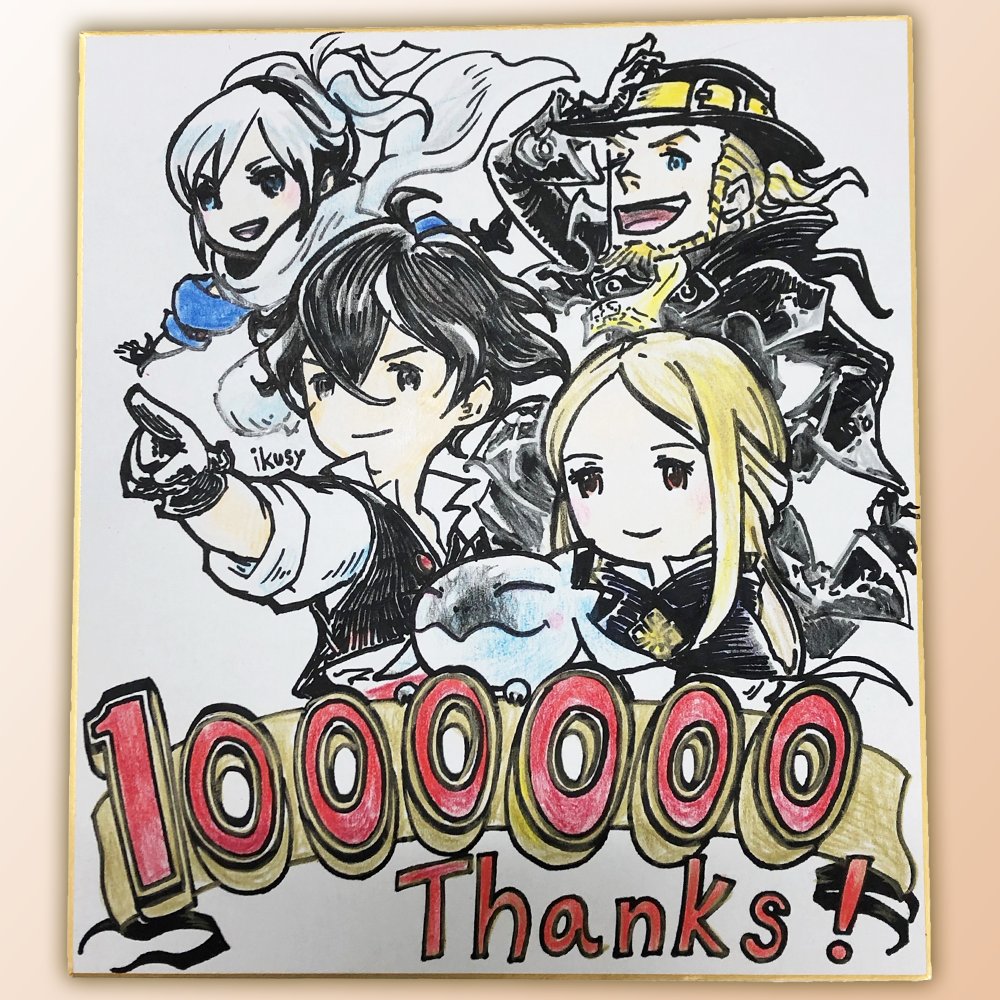 A lot of intriguing lore details are kept ambiguous like this. It's not necessarily a bad thing, leaving a couple strings untied keeps the players curious (and perhaps wanting a sequel), but I felt like a little too much was kept vague, and I was more lost than anything else. The most egregious of this vagueness is Seth's character. From the start, the player can name him. I gave him my own name, "Len," because I thought it'd be cool. It wasn't really. This feature comes at the cost of other characters carefully dodging the need to say Seth's name (most obviously in voice-acted scenes). I was hoping there'd be some insane moment at the end of the game where Seth would say something like "oh, I remember that my name is actually Seth!" ...but that doesn't happen. In addition, his backstory is completely blank. He's a wash-up through an unexplained shipwreck, his homeland is (presumably) in a realm outside of Excillant (and again there are very few details about this world), and his desire to help Gloria, Elvis and Adelle is... kinda contrived? Like he truly doesn't have a reason to follow any of these people.
A lot of intriguing lore details are kept ambiguous like this. It's not necessarily a bad thing, leaving a couple strings untied keeps the players curious (and perhaps wanting a sequel), but I felt like a little too much was kept vague, and I was more lost than anything else. The most egregious of this vagueness is Seth's character. From the start, the player can name him. I gave him my own name, "Len," because I thought it'd be cool. It wasn't really. This feature comes at the cost of other characters carefully dodging the need to say Seth's name (most obviously in voice-acted scenes). I was hoping there'd be some insane moment at the end of the game where Seth would say something like "oh, I remember that my name is actually Seth!" ...but that doesn't happen. In addition, his backstory is completely blank. He's a wash-up through an unexplained shipwreck, his homeland is (presumably) in a realm outside of Excillant (and again there are very few details about this world), and his desire to help Gloria, Elvis and Adelle is... kinda contrived? Like he truly doesn't have a reason to follow any of these people.
All in all, I think this game was really beautiful, but it just fell through in a few places that were unfortunately on the Bravely spotlight. I still think it's a wonderful game, and I will probably hit New Game+ pretty soon, but it left so, so much to be desired. Mr. Tomoya Asano did say that the game had enough success to consider further developments into the series though, so I hope to hear more about it come 2024.
(more to come on this page! i'll be workin on it for a while!)
